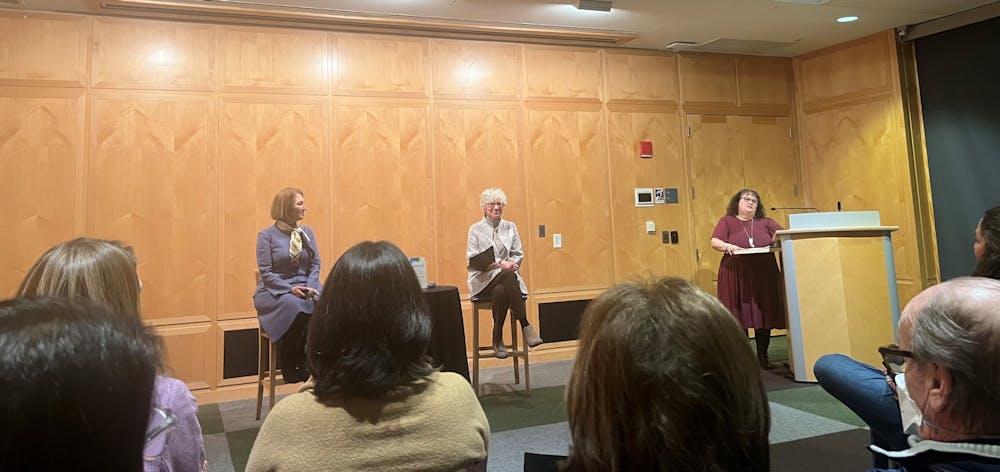Former Dean of the School of Public and International Affairs (SPIA) Anne-Marie Slaughter ’80 spoke on Monday, Nov. 28, about her latest book, “Renewal: From Crisis to Transformation in Our Lives, Work, and Politics.” At the talk, she and Dean of the College Jill Dolan reflected on feminist leadership and the struggle for gender equality.
Their conversation took place at the Princeton Public Library for its annual Phyllis Marchand Leadership Lecture, an event named for the late former mayor of Princeton.
Slaughter served as the head of policy planning at the U.S. State Department under President Barack Obama, the president of the American Society of International Law, and the dean of SPIA from 2002 to 2009. She currently serves as the president and CEO of New America, a liberal think tank, and as the Bert G. Kerstetter ’66 University Professor Emerita of Politics and International Affairs.
Asked what she would like readers to take away from her new book, Slaughter told The Daily Princetonian that “we cannot move forward as a country unless we’re really willing to face the past.”
“Looking backward can be very painful, and you just have to face that,” she added.
Slaughter famously authored “Why Women Still Can’t Have It All,” a 2012 essay in The Atlantic about the impossible expectations that society has for working mothers. Detailing her own experiences as a State Department official, the article became the most read article in the history of the publication and earned her profiles in The Washington Post and NPR.
“When I read that article, it was really close to my experience,” Marina Rabina, an architect based in Princeton who attended the talk, said in an interview with the ‘Prince.’ “I had just come back to work after starting maternity leave, and my bosses told me not to bother coming back.”
Though Slaughter acknowledged on Monday that she will forever be known for that essay, regardless of her other accomplishments, she seemed eager to field Dolan’s questions about her new book.
“I was in the midst of crisis,” Slaughter said. “There were two very bad articles about me, and more importantly about my organization, on the front page of The New York Times.”
The New York Times reported on Slaughter in 2017 when, as CEO of New America, she came under fire after her organization fired several employees who were critical of Google. The former CEO of Google, Eric Schmidt ’76, was a donor and a board member of New America from 1999 to 2016. (Schmidt is also a major donor to the University.)
Slaughter said that one of her first reactions in the wake of the controversy was to call David Bradley, one of her longtime mentors and a fellow board member at New America.
“He told me to run towards the criticism,” she said. “I took his advice. I called every single board member and said, ‘I need you to tell me what I’m doing wrong.’”

“That act of being self-reflexive about how you lead, while you’re leading, is a challenge to present to yourself,” Dolan said. “I like to say that I try to lead with humility, humor, and humanity.”
Their conversation dwelled on what it means to be a female leader in male-dominated organizations.
“In your book, you talked about rejecting a vertical notion of leadership for a horizontal notion of leadership, which I think is a deeply feminist principle,” Dolan said. “I wonder how you bring that ethos to the table.”
Slaughter responded that she prefers fluidity in her workplace.
“There are two ways of exercising power: you can be at the top of the ladder in a vertical structure,” she said, “or you can be the center of the web in a horizontal structure.”
“In both places there is power, but I sure care about being in the center,” she added.
Both speakers acknowledged that leadership does not always manifest in outward action and that leaders should know when to step aside and make room for other perspectives.
Slaughter remembered a commencement address that she made at Barnard College in 2016, when students protested her selection and wrote op-eds requesting that the author Chimamanda Adichie speak instead.
“I would prefer my commencement speaker to be someone who preaches a feminism like mine — one that is intersectional and inclusive to its core,” one student wrote in a petition.
Though Slaughter said that she was conflicted at the time about whether to give the address, she confessed at Monday’s talk that she should have ceded her speaking time to Adichie.
“That could have been a moment of making room,” she said, “and also of giving agency to the students who really wanted to be heard.”
Dolan echoed this sentiment of inclusion when describing her experience as Dean of the College.
“I think that often leadership is about interventions,” she said, “and making sure that you’re getting feedback and information from everyone at the table.”
“I try to note who isn’t talking in the room and find ways to call on them,” she added.
Towards the end of the conversation, the speakers emphasized that shyness is not inherent to women, nor is leadership inherent to men. They attributed the stereotypical differences between men and women to social constructs that can be understood and dismantled.
“Leadership is not born,” Slaughter concluded. “But it can be ingrained.”
Anna Salvatore is a staff News writer for the ‘Prince.’ Please direct any corrections requests to corrections[at]dailyprincetonian.com.








